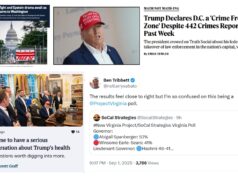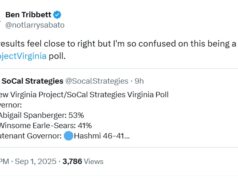With the corruption case of former Virginia Gov. Bob McDonnell heading to the Supreme Court tomorrow, the Kojo Nnamdi Show earlier today took an in-depth look at the charges, the legal reasoning, and why McDonnell most certainly DID engage in corrupt activities with Jonnie Williams. Key points by Randall Eliason (Professorial Lecturer in Law, George Washington University Law School; former Chief of the Public Corruption/Government Fraud, D.C. U.S. Attorney’s Office) from today’s show were (also, check out audio below and on the show’s website):
- The charges against the McDonnells are that businessman Jonnie Williams, “over a period of about two years, gave the McDonnells a series of secret gifts that ended up totaling about $175,000…included a Rolex watch…designer gowns for Mrs. McDonnell…paid for the caterer at their daughter’s wedding and gave them $120,000 in no-interest, no-paperwork quote-unquote ‘loans.'” In exchange, the McDonnells “agreed that they would use the power of the governor’s office to promote a product that Williams’ company made, called Anatabloc…within the Virginia government…So the basic charges were corruption, bribery, that in exchange for these gifts, the McDonnells agreed to promote Williams’ product within the government.”
- After a trial, a jury in September 2014 convicted them both on multiple counts of bribery and conspiracy, and that was affirmed by the Fourth Circuit Court of Appeals unanimously.
- McDonnell’s team is mainly arguing that whatever he did for Wiliiams, “legally, it doesn’t amount to official acts or official action as that’s defined in federal bribery…it might be unseemly or embarrassing, but it’s not a criminal bribery case…because it doesn’t amount to official action.” McDonnell’s team is also claiming that “this gives too much power to the prosecutors to decide who to go after.”
- According to Eliason, “the law of bribery is very clear,” the key is the “corrupt agreement,” in this case between Williams and the McDonnells, to sell the official office. Ergo, it doesn’t matter what McDonnell actually ended up doing, but again, what he AGREED to do.
- The principle evidence against the McDonnells was the testimony of Jonnie Williams, as well as “the nature of the gifts themselves; these were not campaign contributions or donations to McDonnell’s PAC…these were secret gifts…extravagant personal gifts to McDonnell..[that is] also substantial evidence of corrupt intent…it’s not like they were lifetime friends, they had really no relationship before McDonnell became government…Williams wanted something in return [for his gifts to McDonnell].”
- Two more keys to this case are: 1) this would not be corruption if it were an open, disclosed, legal donation to a political campaign or PAC — “generalized political support”; 2) that there be a specific “quid pro quo” – an “express deal” – for the secret, corrupt gift. This situation is NOT analogous to a campaign contribution — “this is about corrupt, secret gifts, and the nature of the gift matters…not all quids are created equal.”
- What McDonnell did most certainly was not free speech under the 1st Amendment; “this is not a campaign finance case…it almost trivializes the 1st Amendment to suggest that this is really a constitutional case; I don’t think James Madison thought that the Bill of Rights was protecting the right of someone to give a politician a Rolex or take his wife on a $10,000 shopping spree in exchange for political favors.”
- Eliason says it’s a “great mystery” why the Supreme Court even took this case, that “there wasn’t really a Circuit split that they needed to resolve,” and that “the implications for the future are all going to depend on the details.”
Any further questions after listening to Eliason’s analysis? The only other point I’d make is that I’m all for prosecuting politicians of EITHER party, whether Democrat Rod Blagojevich or Republican Bob McDonnell, for this corrupt behavior. In an ideal world, I’d go even further, making it a crime to be wined and dined or by lobbyists from corporations with business before the state, or other forms of influence/access-buying behavior by corporations and wealthy individuals. In other words, in my ideal world, lots of Virginia politicians would be in deep legal trouble right now. Unfortunately, from a good government point of view, it’s far from an ideal world…





![Monday News: Trump’s Lunacy Pushes China, Russia, India, etc. Together; “Happy Labor Day. Donald Trump and Elon Musk Are Screwing Workers.”; “Where is the [media’s] intense focus on Trump’s failing health?”; ““Trump says he is not a dictator. Isn’t he?”](https://bluevirginia.us/wp-content/uploads/2025/09/montage0901-238x178.jpg)








